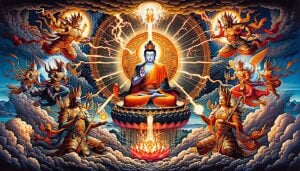Teaching video: Why is it important to state Bodhichitta motivation and dedicate the merit of practice? answered by H.E. Zasep Tulku Rinpoche
Every Mahayana Buddhist practice or meditation should begin with a Bodhichitta motivation and end with a Bodhichitta dedication. This is what makes the practice “great” or Maha.
In a short video, H.E. Zasep Tulku Rinpoche — spiritual head of Gaden for the West mediation centres — explains just why this practice is not simply symbolic — it is vital. The magnificent voice of Yoko Dharma finishes this short video with a wonderful chanting of the “Dedication of Merit.” [Rinpoche’s biography at end of the feature.]
Watch the short teaching video [full transcript and meditation images below the video.]:
Transcript of teaching by H.E. Venerable Zasep Tulku Rinpoche
Buddha Weekly Presents
Advice from the Teachers
Bodhichitta Motivation and Dedication is Important to Daily Practice
A student asks the teacher: “Why is it important to state Bodhichitta motivation and dedicate the merit of practice?”
Rinpoche answers: “Thank you. I will explain the importance of motivation and dedication, according to Buddhist tradition.
Motivation at the beginning, and dedication at the end. According to Kadam tradition and Gelug tradition, in the Lamrim teachings, mentioned it is very important to have right motivation in the beginning — the beginning of your practice.
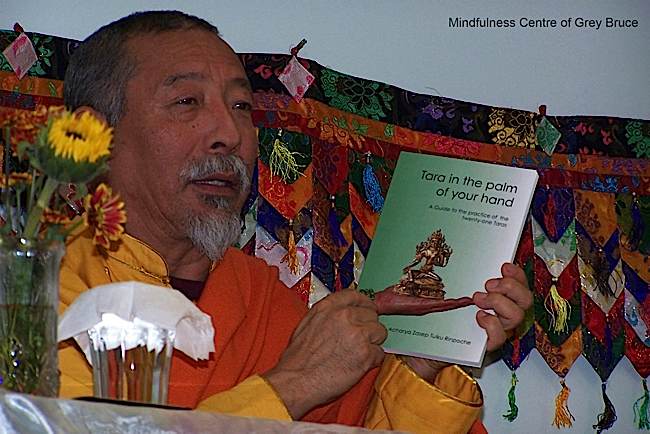
Let’s say you sit down to meditate, or do sadhana practice — whatever practice you do — you must, and should, begin with right motivation, pure motivation. That makes a big difference for your practice.
For instance, when you generate Bodhichitta motivation, pure motivation, you say, from your heart, “I would like to do this practice, meditation session, or sadhana practice, or mantra recitation, for the benefit of all sentient beings. Enlightenment for all sentient beings. May I become Buddha for the sake of all sentient beings, as soon as possible. For that reason, I am going to do Samatha Vipassana meditation, or I would like to do sadhana — say, sadhana of Tara, or sadhana of Avalokiteshvara.”
So, now your motivation is Bodhichitta motivation.
So then, throughout the practice, you spend one hour, two hours, three hours, doesn’t matter, throughout your time, your practice becomes Mahayana practice, because you cultivated pure motivation.
When we say Mahayana, Maha means “great” and “Yana” means “vehicle”. So, what makes Mahayana and what makes Hinayana and so forth. See, if your motivation is Bodhichitta, you have Bodhichitta motivation, you practice your meditation and sadhana for the benefit of all sentient beings.
So, that is the Mahayana. That is the big vehicle. It’s like you’re driving a big bus like a school bus — that’s Mahayana. There’s more space, and more room inside this vehicle. You can have many people in this bus.
You keep going, keep going.
Therefore, motivation, in the beginning, is important.
If your motivation is simple, or a little bit unclear, or, impure motivation, in other words, “I want to do this practice just for myself” and “I want to get Enlightened” or “I want to escape from Samsara” and so on, then, the motivation is — it’s okay, but it’s not a great motivation. It is not benefiting so many. So, this is why motivation, in the beginning, is very important, and, the intention. As we say, generally, the “intention is important.” The intent. The thought counts!
Dedication at the End
So, now, the dedication at the end. Dedication means after the meditation, after the practice, you make sure your practice is, kind of, “saved.” Like you have a document in the computer. You make sure it’s saved, so then it won’t disappear.
You dedicate your practice, again, to the cause of Enlightenment for all sentient beings. Then, your practice will become the cause of Enlightenment. It will benefit all sentient beings!
So, you save, and preserve. It cannot be ruined; it cannot be destroyed by anger, or confusion of your own mind.
If you have not dedicated the practice for the sake of Enlightenment for the benefit of all sentient beings, and later on you have some regret or some confusion about your practice, then, the practice you have done is not sure that it actually will become the cause of Enlightenment — or not.
So that’s why motivation at the beginning, and dedication at the end is important.
Tibetan word, according to Kadampa tradition, in Tibetan — tok ta ni la chow a nee [phonetic]. Tok, is a short word for Toma, it means beginning, ta is the last. Tok ta ni la — beginning and end — the two things you have to consider: motivation and dedication.
Chant the dedication mantra along with the wonderful voice of Yoko Dharma.
GE.WA DI.YI. NYUR.DU. DAG
By this virtue may I quickly

LA.MA SANG.GYEY DRUB.GYUR.NEY
Attain the state of a Guru Buddha (Enlightenment)
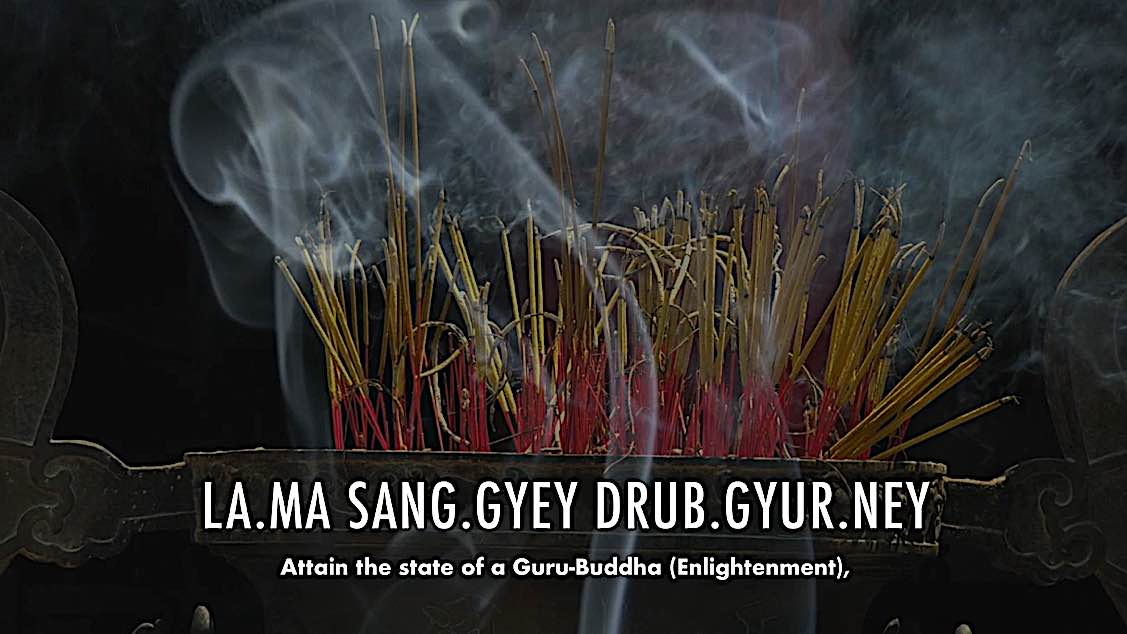
DRO.WA CHIG.KYANG MA.LU.PA
And then may I lead every being
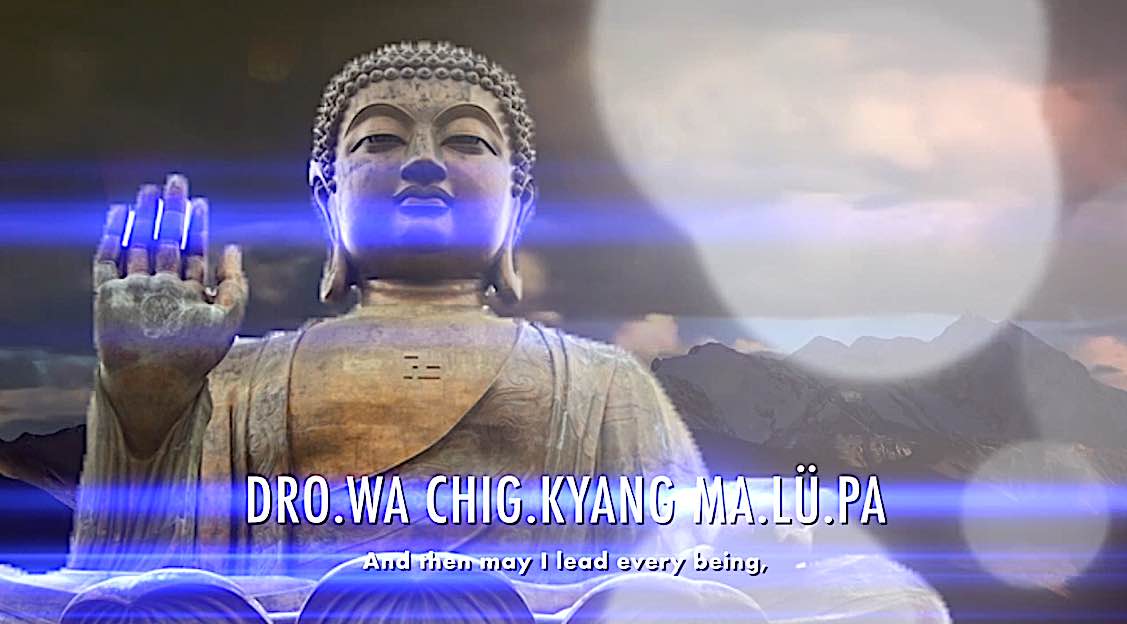
KYEY.KYI SA.LA GO.PAR.SHOG
Withouth exception into that state.
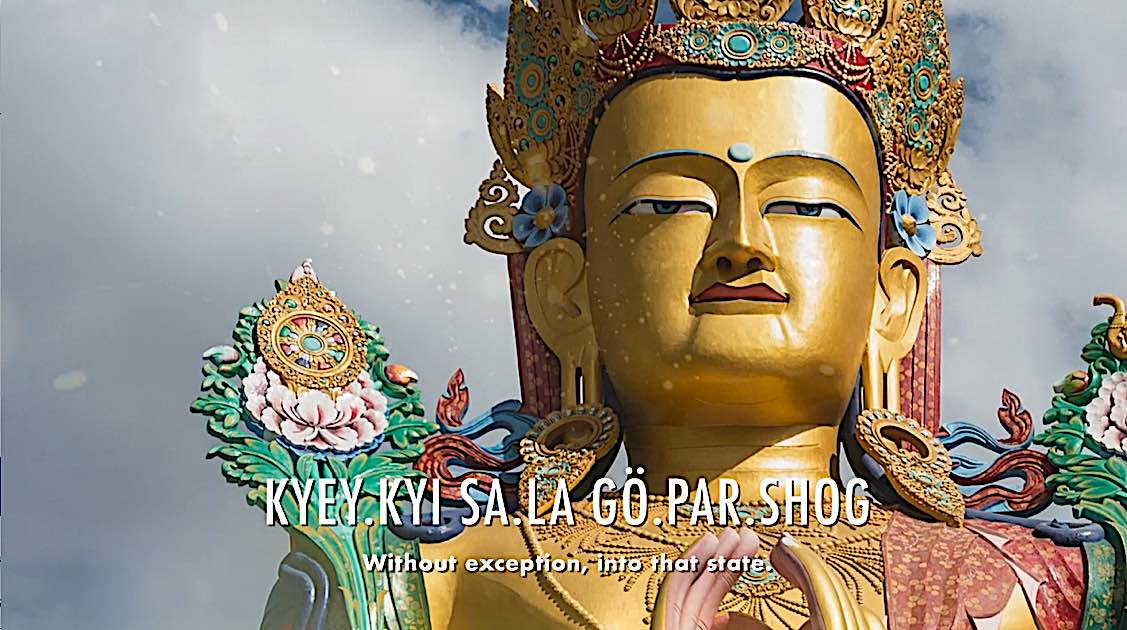
JANG.CHUB SEM.CHOG RIN.PO.CHEY
May the most precious and supreme bodhichitta awakening mind
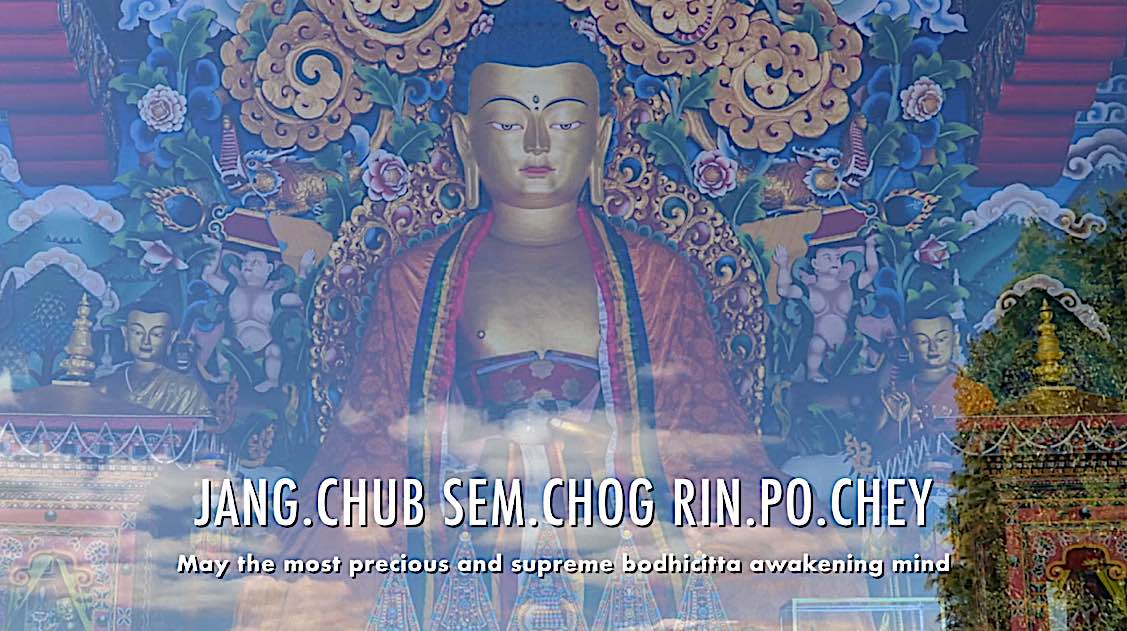
MA.KYEY PA.NAM KYE.GYUR.CHIG
Which has not yet been generated now be generated
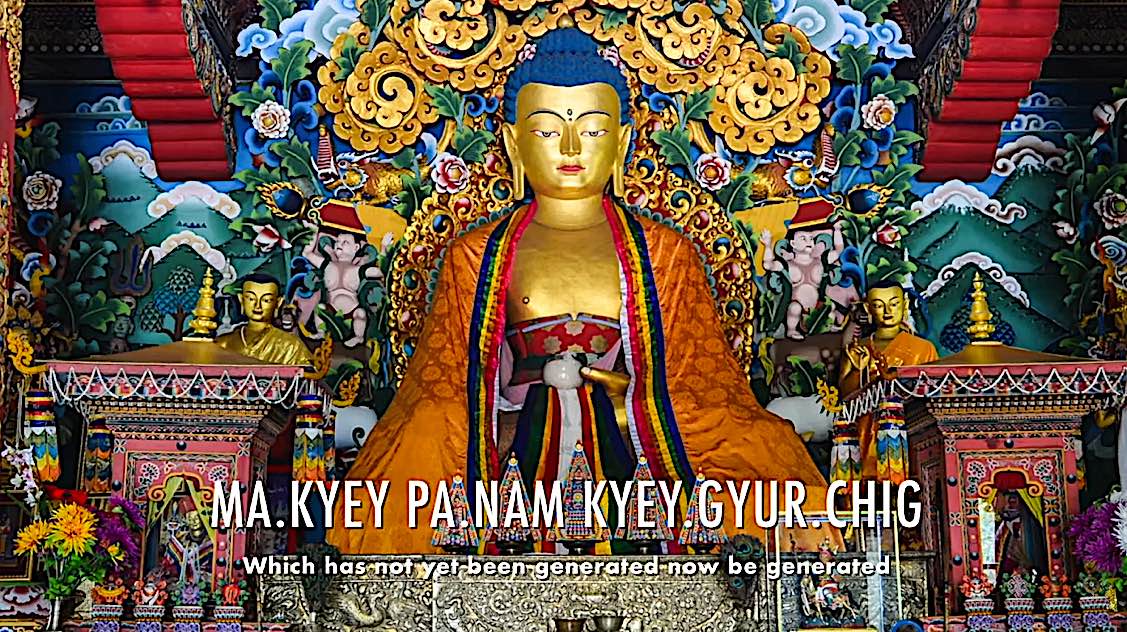
KYEY.PA NYAM.PA MEY.PAR.YANG
And may the precious mind of bodhichitta which has been generated
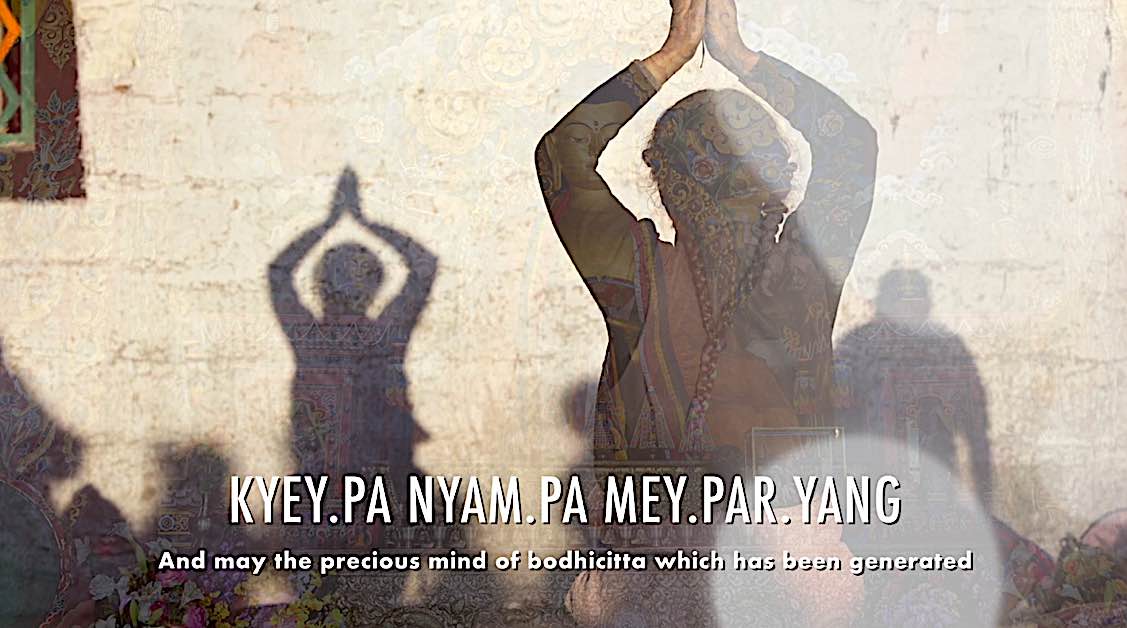
GONG.NEY GONG.DU PEL.BAR.SHOG
Never decline, but always increase.

ABOUT VENERABLE ZASEP TULKU RINPOCHE
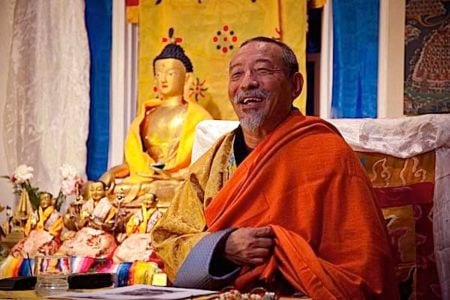 Rinpoche is popularly known for his approachable teaching style, strong humor and teachings based on a long lineage of great lamas. His own gurus included the most celebrated of Gelug teachers: His Holiness Kyabje Trijang Rinpoche, His Holiness Kyabje Ling Rinpoche, Venerable Geshe Thupten Wanggyel, His Holiness Kyabje Zong Rinpoche, Venerable Lati Rinpoche, Venerable Tara Tulku Rinpoche and Venerable Khalkha Jetsun Dampa Rinpoche.
Rinpoche is popularly known for his approachable teaching style, strong humor and teachings based on a long lineage of great lamas. His own gurus included the most celebrated of Gelug teachers: His Holiness Kyabje Trijang Rinpoche, His Holiness Kyabje Ling Rinpoche, Venerable Geshe Thupten Wanggyel, His Holiness Kyabje Zong Rinpoche, Venerable Lati Rinpoche, Venerable Tara Tulku Rinpoche and Venerable Khalkha Jetsun Dampa Rinpoche.
Rinpoche is spiritual director of many temples, meditation centres and retreat centres in Australia, the United States and Canada. He was first invited to teach in Australia by Lama Thubten Yeshe in 1976.
More on Zasep Tulku Rinpoche>>
Gaden for the West Meditation Centres
Australia
- Vajra Ling, Uralla, N.S.W.
- Losang Gyalwa Mandala, Sydney, N.S.W.
- Tenzing Ling Centre, Quamaa, N.S.W.
- Dorje Ling Retreat Centre, Lorina Valley, Tasmania
Canada
- Chittamani Mahayana Buddhist Meditation Centre, Ottawa, Ontario
- Gaden Choling, Toronto, Ontario
- Medicine Buddha Centre, Calgary, Alberta
- Potala Tibetan Buddhist Meditation Centre, Thunder Bay,Ontario
- Tashi Choling, Nelson, B. C.
- Zuru Ling Society, Vancouver, B.C.
United States
- Golden Blue Lotus Tara Meditation Center, Moscow, Idaho
- TsongKhapa Center, Kalamazoo, Michigan
- Vajrayogini Center, Seattle, Washington

Note
Yoko Dharma’s brilliant vocalization of “Dedication of Merit” is used with her kind permission. Information on Yoko Dharma (or to download the track) please visit here>>
More articles by this author
Search
Latest Features
Please support the "Spread the Dharma" mission as one of our heroic Dharma Supporting Members, or with a one-time donation.
Please Help Support the “Spread the Dharma” Mission!

Be a part of the noble mission as a supporting member or a patron, or a volunteer contributor of content.
The power of Dharma to help sentient beings, in part, lies in ensuring access to Buddha’s precious Dharma — the mission of Buddha Weekly. We can’t do it without you!
A non-profit association since 2007, Buddha Weekly published many feature articles, videos, and, podcasts. Please consider supporting the mission to preserve and “Spread the Dharma." Your support as either a patron or a supporting member helps defray the high costs of producing quality Dharma content. Thank you! Learn more here, or become one of our super karma heroes on Patreon.
Venerable Zasep Rinpoche
Author | Buddha Weekly
Rinpoche is spiritual head of many Dharma Centres, and teaches around the world. Originally from Kham province in Tibet (born 1948) Rinpoche has taught in the west since 1976, after he was first invited by Geshe Thubten Loden and Lama Yeshe to teach at the Chenrezig Institute in Australia. Today, he is spiritual head of the Gaden for the West centres in Canada, U.S., and Australia and also spiritual director of the the charities Gaden Relief Project (Canada) and Manlha Tus NGO (Mongolia). He is the author of three books, including his latest release in 2018 with a rare English commentary and practice instructions for Gelug Mahamudra.















